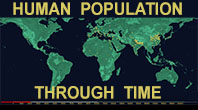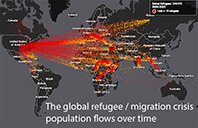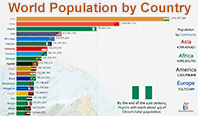How should ecological citizens think about immigration?
Respect for nature demands sharing landscapes and resources fairly with other species, which cannot be achieved without limiting human populations. So ecological citizens, the authors argue, should support measures to decrease fertility rates and limit immigration, both of which are necessary to reduce currently excessive populations. Global population growth will only end when enough individual nations embrace their own populations' peak and decline; hence, setting immigration levels that allow for national population contraction is needed... high immigration undermines both national and global population stabilization and does not solve the problems which drive emigration. Combined with reduced per capita consumption, smaller populations will help developed nations to quit hogging a disproportionate share of the global ecological commons, decrease greenhouse gas emissions and open up new opportunities for ecological restoration and rewilding...
Ecological citizens, like environmentalists generally, are conflicted about immigration...
At the level of first principles, ecological citizens recognize intrinsic value in the non-human world, and an ethical duty to share Earth's lands and seas fairly with other species...
But at a minimum it means preserving robust populations of all remaining native species, rather than continuing to displace and extinguish them. Given this goal, ecological citizenship is centrally concerned to limit human demands on non-human nature - not grudgingly, but gladly, as a necessary part of affirming our desire to live in community with other species...
Patrick Curry (2017) writes in the first issue of this journal that given the parlous and rapidly deteriorating state of global biodiversity, ecological citizens should support substantially shrinking current human populations... The conclusion itself seems justified, given two caveats: we should work to decrease population size only through morally acceptable means; and not as a panacea, but as part of a comprehensive environmentalism...
Immigration as an environmental issue
At the national level, this justifies non-coercive measures to decrease fertility rates... But by the same token, it seems to justify limiting immigration, since the demographic consequences of high immigration levels can be equally consequential, and can readily overwhelm the benefits of lower fertility rates...
It is ecological citizens' duty to help our nations craft immigration policies that are racially non-discriminatory*, economically equitable and fair to other species and future generations. Not talking about immigration will not make the issue go away...
About the authors
Philip is Professor of Philosophy at the School of Global Environmental Sustainability, Colorado State University, Fort Collins, CO, USA. Jane is Honorary Senior Research Fellow at the School of Agriculture and Food Sciences, University of Queensland, St Lucia, QLD, Australia
Related
* The article recommends that "nations craft immigration policies that are racially non-discriminatory." Yet nations are indeed based upon cultural and racial characteristics. It is only logical that a nation, wishing to preserve its intrinsic qualities, would choose to import people from a similar cultural and racial background - that is, if they choose to import anyone at all. See:
Race and immigration - the final taboo
The Nation Is a Biological Group
________________________________________
Population Driven to Double by Mass Immigration
Environment and the consequences of immigration-driven population growth





